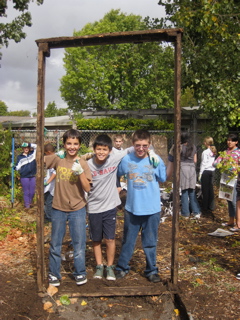
It was back in September, when I received an email from Nicole Calmels, a sixth grade science teacher at Hill Middle School in Northern California, asking for parent volunteers. The school's garden had been neglected for the last 3 years and she wanted to resurrect it with her class. I told her I'd come by once or twice to lend some of my master-gardening advice, but I wasn't going to be conned into a long-term parent-volunteer commitment. I'd been around the block. "I'm from New York. I can smell a rope-a-dope operation two zip codes away," I told her.
Sigh ... I've been helping out weekly at the school garden now for the last 5 months. How can you leave when sixth-grader, Emily Weston says, "My experiences in the school garden have been some of the greatest times of my life." You can't leave. You're stuck. Sucker-punched by a sixth-grader.
I had no choice. I had to stay, so I decided to make it my goal to turn those kids into tree-huggers and flower enthusiasts for life, just like the junk food and video game companies aim to do. Imagine children addicted to something good that won't kill brain cells, clog arteries or make them sick, obese and clueless? But what is necessary for this cradle-to-grave gardening indoctrination is a passionate teacher and a visionary school principal.
"I couldn't bare to see the garden neglected any longer. I thought it would be a great opportunity for me to share what made me so interested in science in the first place; the outdoors," said Nicole Calmels. "Luckily our school Principal, Chona Killeen, was very supportive of the garden. The administration's support can rally teachers to work together on such projects, while lack of support can crush the desire to go the extra mile."
Thanks to Sonoma Compost, Dugdale's Landscaping and a group of determined parents and students, a Sunday afternoon in November was spent building 6 raised beds and filling them with soil and compost. After that, a small group of Master Gardeners, organized by Robi Aragon of Sloat Garden Center, came to help out once or twice a month. As student, Julianna Jochumson so eloquently put it, "The thing I like most about the garden is being able to have hands-on projects instead of sitting in a big, boring classroom all day." The Master Gardeners supervised groups of 4-6 students in various gardening tasks such as pruning roses, creating a compost pile and a worm bin, weeding, watering, dividing perennials and planting flowers that attract beneficial insects. Key science concepts like plant anatomy, food webs,
